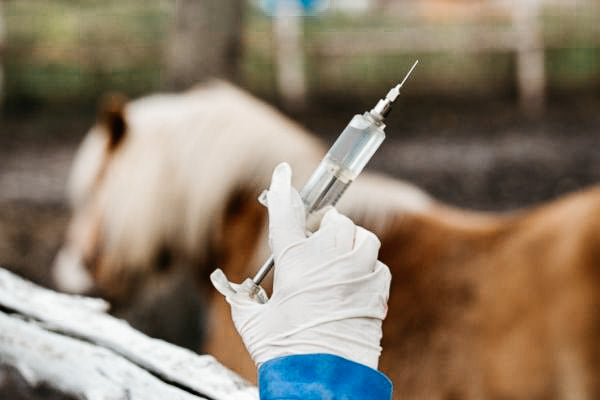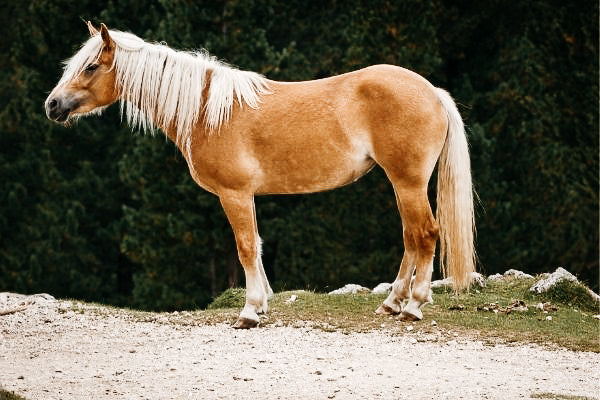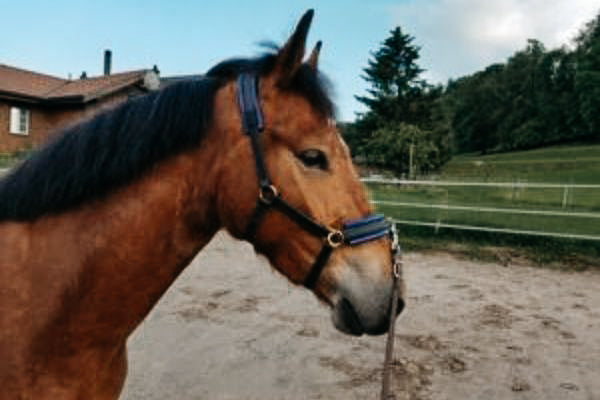
Vaccinate horses
Protect horses thoroughly in a timely manner – including against the West Nile virus
West Nile virus: back in Germany since September 2018
It is a serious warning for all horse owners: West Nile virus emerged in Germany in 2018. It was first diagnosed in birds in eastern Germany at the beginning of September; In the same month, a horse in Brandenburg died from the pathogen, which the Friedrich Loeffler Institute was able to clearly detect as West Nile virus (WNV). The tricky thing about the virus: The majority of affected horses show no symptoms.However, after an incubation period of three to fifteen days, acute attacks of fever and neurological disorders can set in, as is the case in 8% of infected horses; This form of the disease is associated with a death rate of 30 to 50%. “Surviving horses often show permanent damage,” says StIKoVet[i], which now recommends that horse owners vaccinate their horses against West Nile virus.

Vaccination saves horse lives
Core vaccinations: What is mandatory and when?
There are two vaccinations for horses that are mandatory without exception: the vaccination against tetanus (“tetanus”) and influenza (“horse flu”). Tetanus is a bacterial infection caused by spore formers that occur in soil worldwide and to which horses are particularly sensitive. When an infection occurs, a neurotoxin is formed in the body that damages the nerve cells that control the muscles: Possible (and frightening) symptoms of an outbreak include uncontrollable muscle cramps, sawhorse position, jaw lock and jumpiness. Tetanus has a very poor prognosis for affected animals. After the basic immunization from the sixth month of life, the revaccinations (depending on the vaccine manufacturer or depending on the antibody level) must be repeated at intervals of one to three years in order to maintain vaccination protection.

The “Horse flu” is a viral disease caused by equine influenza viruses, which is highly contagious via droplet infection and is therefore spread particularly quickly and easily through tournaments and trade. The incubation period is very rapid (24 to 48 hours). The symptoms include, for example:b Fever and loss of appetite or affect the respiratory system, e.g.b with severe cough and nasal discharge. Equine flu usually lasts two to three weeks and can...U. Long-term damage and serious complications from secondary bacterial infections (e.g.b in the lungs). Unprotected stocks are a major source of danger for true influenza epidemics, e.g.b suddenly bring equestrian activities to a standstill and cause great economic damage. The problem is that flu viruses are constantly changing - it is therefore advisable to adapt vaccination protection. The basic immunization with three vaccinations takes place from the age of six months and repeat vaccinations are recommended every six to twelve months. According to the FN, horses that take part in competition should be vaccinated every six months.
To the so-called Core vaccinations, but without compulsory vaccination, also include vaccination against the herpes virus, which can be responsible for abortions, respiratory diseases or severe neurological damage. Herpes viruses with varying degrees of disease occur in horses all over the world. Of particular note are the herpes virus EHV (Equine Herpesvirus) 1, which is responsible for viral abortions, and EHV 4, which occurs in respiratory infections, primarily in weanling foals and young horses. And even if an infected horse does not become acutely ill, it remains a virus carrier and shedder for long periods of time and is therefore a source of infection, especially if stress or immune deficiency activates the virus. Depending on the vaccine, the basic immunization for a vaccination against herpes takes place from the age of six months; the revaccination must take place every six months.
Bredmares should receive vaccination protection against all three core vaccinations; This not only protects the health of the mother mare, but also that of the foal, which absorbs vital antibodies with its first colostrum.

Of course, critics of vaccination warn against vaccination damage and are of the opinion that the harm of a vaccination outweighs the possible benefits or that the risks are even trivialized. Vaccine complications are reported excitedly; but often without technical background or evidence. If all the basics are taken into account - if the horse is healthy during the vaccination, if hygiene is maintained, if the vaccines are used correctly - it is irresponsible from a veterinary and animal welfare point of view not to vaccinate your horses! It is only through the consistent use of vaccines that infectious diseases, including those in humans, have become controllable. Just because deadly epidemics are no longer likely due to the introduction of vaccinations and some diseases (such asb Polio and diphtheria) have even become extinct because of vaccination options, this is no reason to reduce the willingness to vaccinate again. Vaccination reactions to modern vaccines are really rare and are disproportionate to the damage caused by serious infectious diseases.
Non-core vaccinations
Protection against so-called Non-core components are only necessary for horses in special housing conditions or where there is an increased risk of infection. These include, for example:b vaccination against strangles, equine rotaviruses, skin fungus, Lyme disease and, in certain regions of Germany, against rabies; and also vaccination against West Nile virus, which is a notifiable animal disease. For all vaccinations that are additionally carried out, the veterinarian is available to advise the horse owner in order to jointly consider the vaccination goals and effectiveness. If you are worried or want to spare your horse the “stress” of vaccinations, you can have a current vaccination status determined instead of routine vaccinations.
West Nile virus on the rise
First discovered in 1937 in humans in the West Nile district of Uganda, West Nile virus is now found worldwide. It has been firmly established in the Mediterranean region since the 1960s and WNV infections occur regularly, especially in southern and southeastern European countries. In 1999, when the first cases appeared in North America, WNV attracted international attention: the virus spread rapidly from New York - introduced from Tel Aviv - and quickly spread throughout the United States and Canada. Since then, true epidemics with fatalities have occurred again and again.
The transmission route occurs exclusively via virus-carrying, blood-sucking mosquito species (v.a the Culex mosquito) from infected migratory birds to mammals as reservoir hosts. Humans and horses are sensitive, but they are so-called “dead end hosts”. In an infected false host, the viruses no longer multiply to the extent that it could be sufficient to infect additional mosquitoes when they suck blood. The cycle ends in the wrong host.
Many infected horses remain asymptomatic. However, the West Nile virus can lead to flu-like symptoms and even the most severe clinical courses with inflammation of the brain or meninges, which manifest themselves in significant disorders such as stumbling, hindquarter paralysis and even the horses lying down. Older horses in particular are susceptible to such a severe outbreak of West Nile fever. There is no specific therapy against an infection; only the symptoms can be treated appropriately.
Experience from neighboring European countries and the USA has shown that it can be assumed that the West Nile virus will continue to spread in Germany in the coming years. It occurs in the entire bird population in Europe and also in Culex mosquitoes across Europe, can overwinter in the mosquitoes and thus lead to infections of birds, horses and people in the coming years, especially in the peak mosquito season from July to October. The high temperatures of 2018 greatly encouraged the virus to multiply in mosquitoes in our latitudes.
New: Vaccination recommendation against West Nile virus
The StIKoVet now recommends vaccination against WNV according to the following principles: In areas already affected, vaccination should be given no later than the end of March/beginning of April 2019 so that the basic immunization can be completed before the next mosquito season, i.e.H before the end of May 2019. Basic immunization against the West Nile virus requires two vaccinations four weeks apart from a foal age of five months. In the medium term, the aim is to have comprehensive vaccination of horses throughout Germany. Manufacturers are prepared and there is enough vaccine available for these plans. Of the three approved vaccines, two are recommended by StIKoVet (more detailed information can be found in the statement).
Optimal vaccination management in consultation with the veterinarian
A competition horse is inevitably under higher infection pressure than, for example,b a horse in an open stable that only comes into contact with a few “colleagues” throughout its life. But basically: The best protection for each individual horse is through complete and regular vaccination of all horses. Only then will fewer viruses be excreted, the pressure of infection reduced and thus the probability of becoming ill at all - a healthy cycle for better protection of an entire herd. It is certain that vaccinations help to contain (not just fatal) diseases. even prevent it completely; Vaccination is therefore an important option for health prophylaxis that should not be carried out negligently, but rather reliably. Long-lasting and resilient immunity is also possible against the West Nile virus. Appropriate vaccination management can and should always be set up in consultation with the veterinarian and carried out sustainably with a view to ensuring a healthy horse's life.
Many thanks to Bianca Flemm for providing this really great and informative guest post.
Discover more posts

Haflinger horses are one of the most popular horse breeds with a fantastic mane, extremely comfortable to sit on and very sure-footed. Whether in front of the carriage, at dressage and jumping...
Continue reading
cavesson A cavesson can be very useful when training young horses, when lunging or working on the ground, as well as when riding. But how does a cavesson actually work? What are the differences ...
Continue reading
